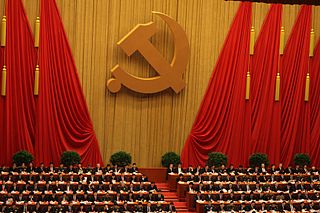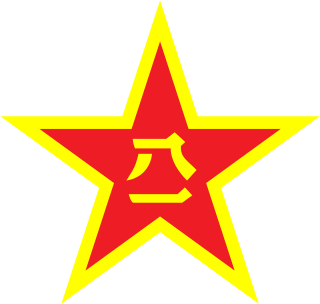
The Politburo Standing Committee (PSC), officially the Standing Committee of the Political Bureau of the Central Committee of the Communist Party of China, is a committee consisting of the top leadership of the Chinese Communist Party (CCP). Historically it has been composed of five to eleven members, and currently has seven members. Its officially mandated purpose is to conduct policy discussions and make decisions on major issues when the Politburo, a larger decision-making body, is not in session. According to the party's constitution, the General Secretary of the Central Committee must also be a member of the Politburo Standing Committee.
The orders of precedence in China is the ranking of political leaders in China for the purposes of event protocol and to arrange the ordering of names in official news bulletins, both written and televised. It is also sometimes used to assess perceived level of political power. Although there is no formally published ranking, there is usually an established convention and protocol, and the relative positions of Chinese political figures can usually be deduced from the order in meetings and especially by the time and order in which figures are covered by the official media. Since 1982, the General Secretary of the Chinese Communist Party has been the highest ranking official in the People's Republic of China (PRC).

The Secretariat, officially the Secretariat of the Central Committee of the Communist Party of China, is a body serving the Politburo and its Standing Committee. The secretariat is mainly responsible for carrying out routine operations of the Politburo and coordinating organizations and stakeholders to achieve tasks set out by the Politburo. It is empowered by the Politburo to make routine day-to-day decisions on issues of concern in accordance with the decisions of the Politburo, but it must consult the Politburo on substantive matters. The de facto head of the Secretariat is the first-ranked secretary.
The 16th National Congress of the Chinese Communist Party was held in Beijing between November 8 and 14, 2002. It was preceded by the 15th National Congress of the Chinese Communist Party. 2,114 delegates and 40 specially invited delegates attended this and elected a 356-member 16th CCP Central Committee, as well as a 121-member Central Commission for Discipline Inspection (CCDI). The Congress marked the nominal transition of power between Jiang Zemin and Hu Jintao, who replaced Jiang as General Secretary, and a newly expanded Politburo Standing Committee line-up. The institutional transition would be completed in state organs by the 2003 National People's Congress in March. Jiang, however, remained head of the Central Military Commission, therefore in practice, the power transition was not complete. The Party National Congress examined and adopted the amendment to the Constitution of the Chinese Communist Party proposed by the 15th CCP Central Committee, and decided to come into force as from the date of its adoption. An amendment to the Constitution was approved the Party National Congress, with Jiang Zemin's signature ideology of "Three Represents" written into it. This congress was succeeded by the 17th National Congress of the Chinese Communist Party.
The 16th Central Committee of the Chinese Communist Party was in session from 2002 to 2007. It held seven plenary sessions. It was set in motion by the 16th National Congress of the Chinese Communist Party. The 15th Central Committee preceded it. It was followed by the 17th Central Committee of the Chinese Communist Party.
The 12th Central Committee of the Chinese Communist Party was in session from September 1982 to November 1987. It held seven plenary sessions. It was securely succeeded by the 13th Central Committee.
The 11th Central Committee of the Chinese Communist Party was in a five-year session from 1977 to 1982. The 10th Central Committee of the Chinese Communist Party preceded it. It held seven plenary sessions in the five-year period. It was formally succeeded by the 12th Central Committee of the Chinese Communist Party.

The 18th National Congress of the Chinese Communist Party was held November 8-15, 2012 at the Great Hall of the People. It was preceded by the 17th National Congress of the Chinese Communist Party. Due to term and age limits restrictions, seven of the nine members of the powerful Politburo Standing Committee (PSC) retired during the Congress, including Hu Jintao, who was replaced by Xi Jinping as General Secretary of the Chinese Communist Party. The Congress elected the 18th Central Committee of the Chinese Communist Party, and saw the number of Politburo Standing Committee seats reduced from nine to seven. It was succeeded by the 19th National Congress of the Chinese Communist Party.

Letter 1949 is a 2008 Taiwanese drama starring Queenie Tai, Lin Yo-wei, Alien Huang, Hawick Lau. It was produced by Eastern Shine Production. The series was broadcast on free-to-air Chinese Television System (CTS) from 9 to 26 November 2008, Monday to Thursday at 20:00.

The Central Financial and Economic Affairs Commission is a commission of the Central Committee of the Chinese Communist Party in charge of leading and supervising economic work of both the CCP Central Committee and the State Council. The Commission is generally headed by CCP General Secretary or Premier of the State Council.

Wu Zi Bei Ge, also known as Wu Zi Bei Ge: Wu Zetian Zhuan, is a 2006 Chinese television series based on the life of Wu Zetian, the only woman in Chinese history to assume the title of "Empress Regnant". The series was directed and written by Chen Yanmin, and starred Siqin Gaowa and Wen Zhengrong as the empress. The series' title Wu Zi Bei Ge literally means "Song of the Uncharactered Stele", with the "stele" referring to the unmarked one standing near Wu Zetian's tomb at the Qianling Mausoleum.

The secretary of the Central Commission for Discipline Inspection (CCDI) is the head of the aforementioned body. The office is a leading political position, and the officeholder has been a member of the Politburo Standing Committee, the highest decision-making body of the Chinese Communist Party, since 19 September 1997. The current secretary is Li Xi, who was elected by the 1st Plenary Session of the 20th Central Commission for Discipline Inspection on 23 October 2022 and approved by the 20th Central Committee on the same day.

The Central Leading Group for Inspection Work is a coordination body set up under the Central Committee of the Chinese Communist Party for the purpose of managing party disciplinary inspections nationwide.

The Commission for Discipline Inspection of the Central Military Commission is the top disciplinary organ of the Central Military Commission of China. The CMCCDI has "dual responsibility" to the Central Commission for Discipline Inspection and the Central Military Commission. The membership of the CMCCDI is selected by the Central Military Commission.
The 19th National Congress of the Chinese Communist Party was held at the Great Hall of the People, Beijing, between 18 and 24 October 2017. 2,280 delegates represented the party's estimated 89 million members. Preparations for the 19th National Congress began in 2016 and ended with a plenary session of the Central Committee a few days prior to the Congress. In 2016, local and provincial party organizations began electing delegates to the congress as well as receiving and amending party documents. It was succeeded by the 20th National Congress of the Chinese Communist Party.
The 19th Politburo of the Chinese Communist Party (CCP), formally the Political Bureau of the 19th Central Committee of the Communist Party of China, was elected at the 1st Plenary Session of the 19th Central Committee of the CCP on 25 October 2017 in the aftermath of the 19th National Congress. This electoral term was preceded by the 18th Politburo and succeeded by the 20th. Seven of the 25 members served in the 19th Politburo Standing Committee.
Chen Xiaojiang is a Chinese editor and politician who is the Executive Deputy Head of the United Front Work Department of the Central Committee of the Chinese Communist Party since 2022. Previously, he served as Minister of the National Ethnic Affairs Commission; deputy director of the National Supervisory Commission, the highest anti-corruption agency of China; and deputy secretary of the Central Commission for Discipline Inspection, the party's internal disciplinary body.
The China men's national artistic gymnastics team represents China in FIG international competitions.





